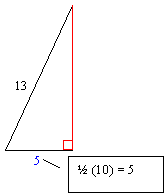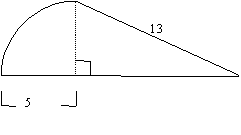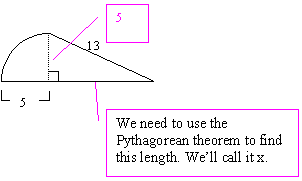|
|
Example 1) Find the area:

The formula for the area of a triangle is
A= ½ bh. We know the base of this triangle has length 10. The height
is the line segment from the top of the triangle perpendicular to the base.
Since the height makes a right angle with the base we can use the Pythagorean
Theorem in the triangle formed by the height. Since the original triangle
is isosceles (has two equal sides), the height will divide the base in
half.
| 52 + h2 = 132
25 + h2 = 169 h2 = 169 – 25 h2 = 144 h = So the area is A= ½ (10)(12) A = 60. |
 |
Practice Problems:
Find the area:
4. 
5. 
4. 
32+x2=52
Þ 9+x2=25
Þ x2=16
Þ x=4.
A= (4)(3)= 12
5. 
x2+52=132 Þ x2 +25 =169 Þ x2=144 Þ x=12.
| A = |  |
= 6.25 |
Copyright © 1997 Bamdad Samii